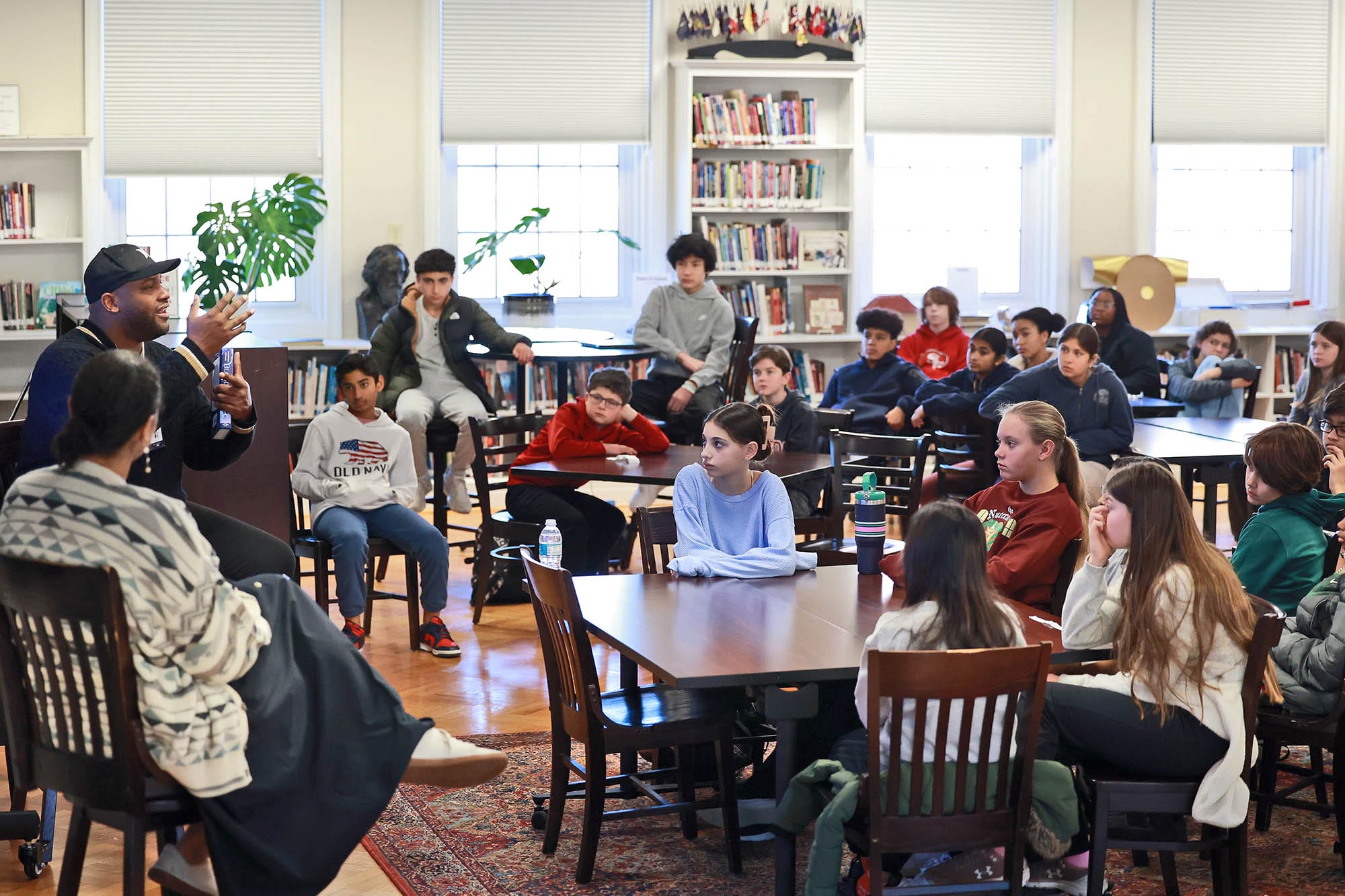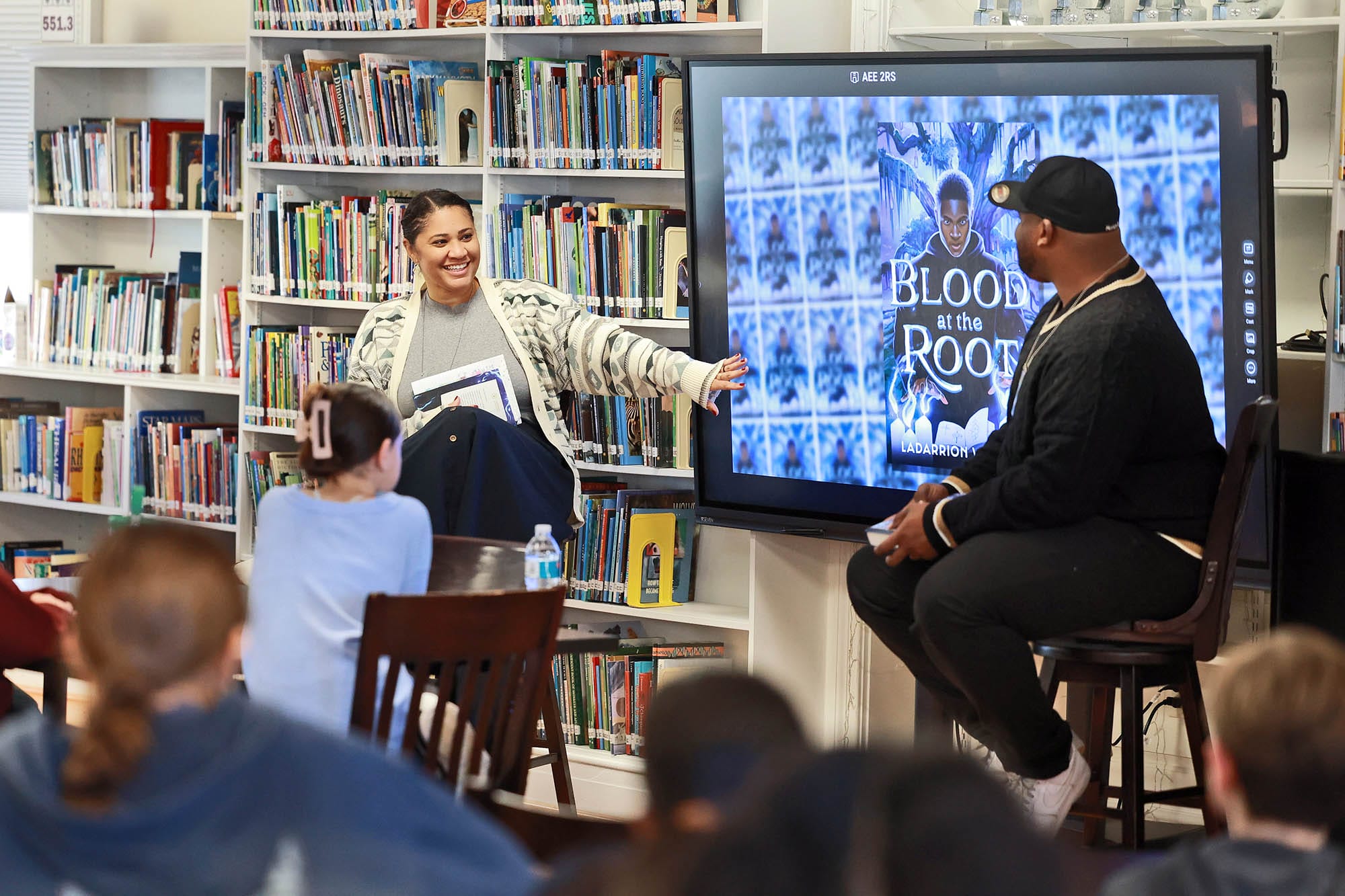Sixth and seventh-grade scholars were excited to welcome author LaDarrion Williams to the Messing Library last week to hear about his new young adult novel, Blood at the Root, and his writing and publishing process. Williams is a Los Angeles-based playwright, filmmaker, author, and screenwriter whose goal is to cultivate a new era of Black fantasy, providing space and agency for Black characters and stories in a new, fresh, and fantastical way. He is currently a resident playwright/co-creator of The Black Creators Collective, where his play UMOJA made its West Coast premiere in January 2022 and produced North Hollywood’s first Black Playwrights Festival at the Waco Theater Center. Blood at the Root is his first novel. His viral and award-winning short film, based on the same concept, is currently on YouTube and Amazon Prime.
Rajean Erba, with the Novel Neighbor, moderated an interview with Williams for three groups of middle schoolers. She asked him a variety of questions before opening the floor for students, and started by requesting that Williams provide a summary of his new work.
“Blood at the Root is about a young black kid, Malik, blessed with really cool magical powers,” said Williams, “who gets accepted into a magical college, an HBCU for kids with powers, to learn about his ancestral magic and uncover dark secrets about his mother’s mysterious disappearance.”
He spoke about writing of Malik’s experience going to college. “The party side was fun to write. Malik goes to a pool party, and girls come out of the water as mermaids. The history class was harder. How do you make a history class interesting? How about if I make it interactive? The professor writes a date on the blackboard, and the students are transported to different times and places. I wanted to make it fun and interesting. I was that kid in history class falling asleep or sneaking in headphones to listen to music,” Williams laughed.
“Writing in school is important. It’s good to learn world-building in an academic program.”
-LaDarrion Williams
In creating his magic system, Williams pulled from Hoodoo and Voodoo, African-inspired Caribbean spiritual practices. Hoodoo focuses on the natural environment, while Voodoo focuses on connecting with the spirit world. He tapped into his own family’s history to learn more. “I’m from the South, so I didn’t know my family low-key practiced it with different traditions. In school, students learn about Greek mythology and European magic systems, but these are not so well known. There’s a lot of folklore in the South, and I wanted to infuse that in my story and make it interesting and offer something we don’t really see in books.” In fact, failing to see any characters like himself in books while he was growing up is what inspired Williams to write Malik’s story.
“I wanted to set the story in my hometown with a character who had a face like mine when I was a kid,” he said. “I researched through TikTok, finding people who actually practice and mix concoctions and potions. My mom, when I was growing up, used natural remedies, like mustard for heartburn or rubbing an onion on your foot when you’re sick. It was fun to research. I also pulled from different gospel songs.”
Williams also learned a lot about the Haitian Revolution during his research, including information about the gods the Haitians called upon. “I really liked the cool women warriors in the Haitian Revolution,” he said. “They were gifted with super speed and super strength. I was very surprised to learn about that history that, as a kid, I didn’t get to learn about in school.”
Williams’ initial goal wasn’t to write a book. Blood at the Root started as a script for a TV show. “I live in LA, and I was trying to get Hollywood to make this show, so I tweeted the premise. It blew up on Twitter. This was during the pandemic, and people saw it and wanted me to make a short film. I thought, ‘We can barely get hand sanitizer, but you want me to go out and make a short film?'” Williams laughed. “But I called some friends, and we shot a short film all over LA, acting like we had magical powers. It went viral on YouTube and TikTok.” He encouraged kids to think beyond their initial ideas and reflect on what action is needed to make it a reality.
“Never be afraid to share your ideas and dreams or what you want to do, because you never know.”
-LaDarrion Williams
His social media posts were attracting readers, and publishers started noticing. Williams first secured an agent who helped him make his manuscript better. He explained that if a publisher is like a school, and editors are like teachers, the agent is like the parent, helping connect the author (student) and the editors and publishers. After an editor reviews a manuscript and runs it past their colleagues, they buy the book. That’s only the beginning, though. “Then you have to work on it with your editor for months or even years,” Williams said. “I wrote Blood in 2020 and didn’t publish it until 2024.” The work doesn’t end with publishing. “You then work with your publisher and editor to get your book to the shelves and then to make sure it sells.” He cautioned that patience was important, and then admitted he didn’t have much himself. He was driving for Uber and Lyft when his agent called to tell him that Penguin Random House was offering him a three-book deal, and he had to pull over to the side of the road. He’s in the middle of editing the second book now and is starting to work on the third and last in the series.
“The books you hold in your hand go through so many months of editing. You don’t have to be perfect. Don’t think you do. Don’t be afraid to write. You have to write the story; you have to get to the end.”
-LaDarrion Williams
“Writing a book is different from writing a graphic novel, a play, or a movie script; they’re all totally different,” he notes. “They use different parts of the brain. I write cinematically. I think of images as I write. I even knew how I wanted the cover to look, and I wrote that into the book. I used that skill for my screenwriting. Playwriting is a lot of dialogue. I wanted to capture how young kids and teenagers talk every day in high school or college. I went on social media to see how kids are talking these days. Then I play around with spelling, African American vernacular, and how people talk in the South.” He credits Zora Neale Hurston’s Their Eyes Were Watching God as inspiration.
It took several years for Williams to bring his book to market, and he was honest with the students about how hard it was. “There’s this thing called rejection; if anyone wants to be an artist, you can’t avoid it. After being rejected from Hollywood and not knowing how this story would pan out, I knew publishing a story like this would be difficult. The publishing industry still has a lot of growth to go through in terms of representation for all people, races, genders, and classes.”
He encouraged students who want to write stories to read books in the genre they’re interested in, and implored them to read plays. “Read a lot of plays and go see them; support your local theaters. I learned a lot this way. Playwriting and theater changed my life. I watch a lot of movies, and both television and movies helped me shape a lot of things that happened in the book. Watch your favorite actors and try writing a part and a story for them. Create a cool role. That’s what I do!”
Since Williams relied heavily on his own stories, he encouraged students to stay connected to family and friends. “Always stay connected. That’s what I hope readers take away from your work,” he said. “When the older generation tells you things about your family or history or tells you not to do things this way or that, always stay connected. The trilogy is about reconnecting to who you are. No matter where you come from or what you look like, you deserve to have your story told as well.”
“Don’t be afraid to get inspired from different sources. If you have a story that keeps you up at night, like Blood at the Root did me, then that story needs to be told, and you need to be the one to tell it.”
-LaDarrion Williams
Thank you, Mr. Williams, for sharing your inspiring story with our young writers!











